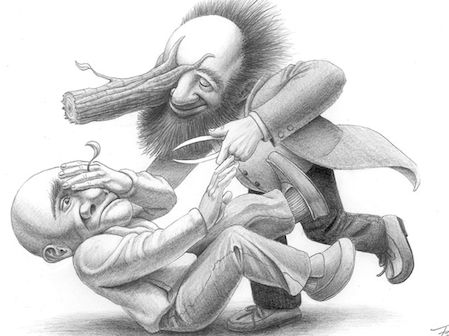Your Marriage Is An Air Filter (Seriously!)
Dust and airborne particles circulate throughout the rooms and ventilation systems of our homes unimpeded until they get to the air filter strategically located in the air handler of your a/c unit. That's where the junk is caught and hopefully dealt with, lest the system becomes clogged and fails.
Like airborne debris, your spiritual junk floats unimpeded through most of the airspace in your life, barely noticed at work, or in your community, or even among your friends and other family members. But there is no way it's getting past the most intimate of human relationships.
You can't hide your junk from your spouse! Your marriage is an air filter. It is a mechanism, strategically designed by God, intended to both serve and protect your spiritual life.
If there are issues in your spiritual life, they are sure to be "caught" in your marriage relationship.

Unresolved anger, selfishness, spiritual or emotional immaturity all "come home to roost." If you aren't who you should be at home, the filter is soon clogged and everything comes to a halt until the junk is dealt with. This is why, when there is real trouble, it is almost always felt in your marriage before it is detected anywhere else. Thus, your marriage is where you will most often be challenged to work on your junk.
Those who fail to understand this principle are inclined to see trouble in their marriage as proof that the marriage itself is the problem. This erroneous thinking leads some to conclude that the solution is to end the marriage — which is like blaming the filter itself for the clog.
Rather, you must learn to see the conflict in your marriage as a divine alarm, sounding off to warn you that your junk needs to be dealt with before you will be able to move forward toward becoming the person God has called you to be.
"In this same way, husbands ought to love their wives as their own bodies. He who loves his wife loves himself" (Ephesians 5:28, NIV).
"As iron sharpens iron, so one person sharpens another" (Proverbs 27:17, NIV).
Uncombable Hair Syndrome
How many times have you awakened, looked in the mirror, and said, “Man, I’m having a bad hair day.” Well, for the 100 or so people around the world with the ultra-rare disease, Uncombable Hair Syndrome, they wake up every single morning to that reality. UHS stems from a genetic mutation through which the hair shaft takes on a rather triangular shape, causing the hair to stand up straight from the head, making it impossible for the hair to lay flat. As such, sufferers look unkempt, ungroomed, unruly, all the time.
No amount of effort on their part can manage their “bad hair.” Not rollers, nor, irons, nor gels, nor sprays.
One might think, just from looking, that these people simply don’t care about their appearance, or are blind to how unkempt and unruly they look. That’s because it takes a deep look into their genetic code to see just what’s really going on.

For most of us, we look into the mirror and we say to ourselves, “Hey, I don’t look too bad today!” And even if we awaken with a bad hair day, we can pull out the hot rollers or hair gel, and voilà, problem solved. We can present with a fairly tidy appearance. But what if we looked deeper into the mirror, into the core of our being?
At our core, in our soul of souls, we are all unkempt, untidy, and unruly. That’s because we are all born with a spiritual mutation … a sinful nature.
No amount of behavioral grooming can correct it. Oh sure, we can mask it, and present it with a pretty tidy appearance. We can justify it and say that it's not so bad. But we can’t correct it on our own. Only the “washing and renewing” of our spirit can do that.
“Not by works of righteousness which we have done, but according to His mercy He saved us, through the washing of regeneration and renewing of the Holy Spirit.” (Titus 3:5, NKJV)
Speck Inspection
Most of us learn pretty early on that in a conflict, getting those feelings of hurt and disappointment out there is more likely to end a relationship than to fix it. But if honesty chases a friend or a partner away, isn't that for the best?
This would be a good time to remember that Jesus said that being honest with others about their faults is like focusing on a “speck” while ignoring the "log" in our own eye.
That's because when we see a fault in someone else, what we can't see is their true motive or what they've been through to cause them to behave that way. By contrast, we know all of these things about ourselves.
As a result, we are in a much better position to see and address our own faults. They are like a log compared to what we can see in someone else.

Because we are all sinful by nature, we operate from an egocentric perspective. The result is that our relationships suffer not so much from poor communication as from the wrong focus in our communication.
But what would happen if we approached relationship problems with a focus on fixing ourselves, first? What if we refused to address the specks in the eyes of others until we had thoroughly dealt with our dysfunctional behavior? Is it possible that others might be more open to what we have to say about their faults if we admitted our own and did something about them?
"You hypocrite, first take the plank out of your own eye, and then you will see clearly to remove the speck from your brother's eye" (Matthew 7:5).